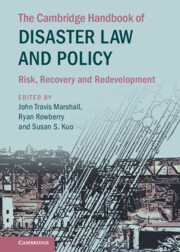Book contents
- The Cambridge Handbook of Disaster Law and Policy
- The Cambridge Handbook of Disaster Law and Policy
- Copyright page
- Dedication
- Contents
- Figures
- Maps
- Tables
- Contributors
- Foreword: Current Trends in Disaster Law and Policy
- Acknowledgments
- Introduction
- Part I Critical Perspectives on the Evolution of Disaster Law and Policy
- Part II Effective Governance as an Imperative for Responsive Disaster Law and Policy
- 3 Governance Structures for Recovery and Resilience
- 4 Governance Strategies for Mitigating Urban Heat Island Effect
- 5 Regulatory Institutional Considerations for Preventing Mining Dam Disasters in Brazil
- 6 Integrating Disaster Risk Reduction and Climate Change Adaptation in the Context of Sustainable Development in Africa
- 7 Climate Resilience in the Greater Bay Area of South China
- 8 An Adaptive Legal Framework for Water Security Concerns in the Guangdong-Hong Kong-Macao Greater Bay Area
- Part III Law’s Role in Promoting Hazard Mitigation: Intergovernmental, International, National, and Local Approaches
- Part IV Private Sector Initiatives to Promote Disaster Resilience and Recovery
- Part V Lawyers As Disaster Law and Policy Leaders: Training for Students and Guidance for Practitioners
- Part VI Cultural Heritage Protection and Cross-Disciplinary Opportunities for Advancing Disaster Law and Policy
- Part VII Disasters and Vulnerable Communities
6 - Integrating Disaster Risk Reduction and Climate Change Adaptation in the Context of Sustainable Development in Africa
from Part II - Effective Governance as an Imperative for Responsive Disaster Law and Policy
Published online by Cambridge University Press: 27 October 2022
- The Cambridge Handbook of Disaster Law and Policy
- The Cambridge Handbook of Disaster Law and Policy
- Copyright page
- Dedication
- Contents
- Figures
- Maps
- Tables
- Contributors
- Foreword: Current Trends in Disaster Law and Policy
- Acknowledgments
- Introduction
- Part I Critical Perspectives on the Evolution of Disaster Law and Policy
- Part II Effective Governance as an Imperative for Responsive Disaster Law and Policy
- 3 Governance Structures for Recovery and Resilience
- 4 Governance Strategies for Mitigating Urban Heat Island Effect
- 5 Regulatory Institutional Considerations for Preventing Mining Dam Disasters in Brazil
- 6 Integrating Disaster Risk Reduction and Climate Change Adaptation in the Context of Sustainable Development in Africa
- 7 Climate Resilience in the Greater Bay Area of South China
- 8 An Adaptive Legal Framework for Water Security Concerns in the Guangdong-Hong Kong-Macao Greater Bay Area
- Part III Law’s Role in Promoting Hazard Mitigation: Intergovernmental, International, National, and Local Approaches
- Part IV Private Sector Initiatives to Promote Disaster Resilience and Recovery
- Part V Lawyers As Disaster Law and Policy Leaders: Training for Students and Guidance for Practitioners
- Part VI Cultural Heritage Protection and Cross-Disciplinary Opportunities for Advancing Disaster Law and Policy
- Part VII Disasters and Vulnerable Communities
Summary
Development, and particularly sustainable development, face a growing threat of being undermined by a changing climate, particularly through the impacts of frequent and extreme weather events. It is common knowledge that disasters can wipe out and set back development gains. Conversely, the social, political, economic, and environmental development decisions, options, and the paths chosen, contribute to an increase in inequality, poverty, environmental degradation, vulnerability, and exposure to hazards. Unfortunately, global commitments to deliver the Sustainable Development Goals (SDGs) development planning and programming still do not adequately consider or act upon these risks. Despite advances in linking DRR, CCA, and development, albeit conceptually, there is not much progress on how integration should be carried out. In 2015, three important UN agreements, (1) the Sendai Framework for Disaster Risk Reduction; (2) the Paris Agreement for Climate Change, and (3) the 2030 Agenda for Sustainable Development, were adopted. These three agreements brought coherency on how to reduce the risk and impacts of disasters thus making development gains sustainable. The disparities of locating CCA within environmental authorities, DRR within disaster management authorities, civil service and home affairs, and addressing sustainable development goals through different sectors impede such endeavors to address disaster risk and the negative consequences of disasters coherently. This, in turn, undermines sustainable development. Despite the identified differences between DRR and CCA, they are complementary development issues. Addressing disaster and climate risks to achieve sustainable development goals requires close coordination among the different organizations and sectors. It requires working coherently, avoiding duplication, and taking advantage of synergies and co-benefits in their actions. By examining how interorganizational theory conceptualizes integration, the chapter will provide a theoretical grounding for integrating DRR and CCA, taking into consideration sustainable development, by proposing an analytical framework to integrate the three policy areas.
Keywords
- Type
- Chapter
- Information
- The Cambridge Handbook of Disaster Law and PolicyRisk, Recovery, and Redevelopment, pp. 95 - 106Publisher: Cambridge University PressPrint publication year: 2022



